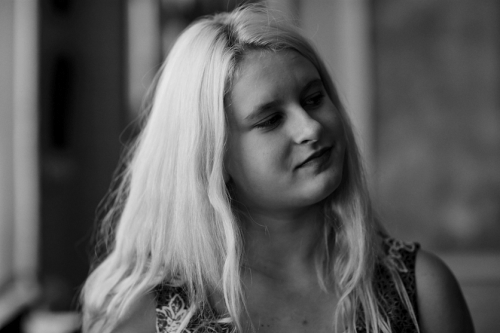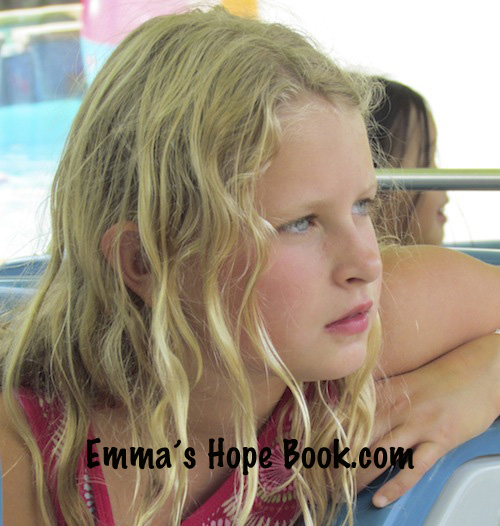*This was an assignment for English Composition to create a podcast about something you care about. This is mine after many revisions and incorporating notes from my teacher. A written transcript of the podcast is below, but if you can, listen first!

Emma – 2016 Photograph by Pete Thompson
This voice? The one that you’re hearing read these words? Yeah, that one. It isn’t my voice. It’s my mom’s. You’re probably wondering why a teenage girl would want her mom to read what she’s written. In my case, it’s because I can’t read what I write out loud. There’s not a direct line between my brain and my mouth. It’s more like an elaborate maze. I can’t speak so people understand what I mean. If asked a question, my mouth says things that do not answer the question. My brain doesn’t think in words the way most people’s do. Names of things and people get handed to me instead of the words that would make sense to the person questioning me. Sometimes I blurt out whole sentences from another time in my life. (Emma’s voice) “I bounce a balloon to Emma. I bounce it back to me.” They may be images that remind me of the person I’m with or where I am, or words I’ve heard spoken by others, things that get caught in my mind, or unrelated scripts, but that convey the exact emotion I’m feeling. (Emma’s voice) “No more ice skating. Ice skating’s gone.” In any case, what I manage to say usually baffles the people I am speaking to, causing them to misunderstand me. Not being able to speak what’s in my heart so that others are able to understand can be challenging, but I can type things that I cannot reliably say. There are computer generated voices that say the letters as I type them and sound like this – (Computerized young girl’s voice) “I am your friendly computerized female voice. I sound like I’m maybe five years old.” (Another computerized young girl’s voice) “Or I can sound like this and pretend I’m British. But yeah, it’s just not me.” Or I can sound like this. Okay it’s not my voice, but with some direction, Mom sounds better than a computer.
Imagine for a minute that you can’t talk to people in any way that makes sense to them or you. Imagine if every time you opened your mouth to speak other words tumbled out. If you are like me, you might get used to not answering people’s questions or being able to stay on topic. So what would you do? How would you interact with people? Would you ignore their questions? Pretend you didn’t hear them? How would you express yourself? Maybe you would try to connect with scripts you’ve memorized, things you’ve heard other people say in similar situations or maybe you’d find non-word based ways to communicate. That’s what I do.
(Sound of footsteps, people talking and the subway)
Sound is everywhere. I don’t have a filtering system marking one particular sound as more important than another. Can you understand what I’m saying right now? Mom had to raise the volume of her voice so that you could hear it above all the other noise. My brain doesn’t do that. It hears all sounds equally and does not discriminate. But some people’s voices are not as dramatic to my ear as the honking of a horn. I love the sound of honking horns. (Horns honking and traffic noise) Favoring some sounds dilutes others, but music has the best sounds of all. (Body Knows Best – Anya Marina)
Music is my first language. It is a friend who loves me unconditionally. It’s there when I need it and does not shed a tear if ignored for some time. Music is a positive force as it stands by my side. I like hearing the same melodies repeated and did so even when I was very young. It’s been a comfort to me as long as I can remember. Music grounds me and plays a huge role in seeking my creativity as it allows me to perform as I choose to. It’s a way to communicate; it gives me hope, tells me I am not alone and inspires me to create. Though people respond differently to music, I believe there are always emotions involved. Music has the ability to transform my fearsome thoughts laden with anxiety and stress. (Music fades out) It calms me and this has been the case throughout my life. When singing lyrics I stumble and have trouble articulating the words, (Lose Yourself – Eminem) but I can remember the sounds I hear and recreate them with my voice. When I sing I am not apart from, but instead am part of.
Music can be both private and public, but it needs to be loud. (Music gets louder) No one composes music in a whisper. My body needs to feel the beat so that I can be consumed by it. (Volume increases steadily and then fades) When that happens I become part of the music, like another instrument or an extension of it. I jump and dance and move. My arms swing or are raised up and my head bops, my whole body keeps time to the beat. I’m transported to another reality and it is in this alternate reality that I am most happy and comfortable.
At home my need for high volume can cause problems because the members of my family have differing sensory needs that come in direct conflict with mine. (Heartless – Kanye West) My older brother has to have music as background, while I perform alongside, so it makes sense for mine to be public and his to be private.
(Emma’s brother) “Yeah I think it’s totally fair that you’re able to use the living room. It’s not like you play bad music or anything. If you played music I didn’t really like, I’ll just shut the door and go in my room and hang out.”
My mom and dad both work at home and need quiet in order to concentrate. I am told to wear headphones, which encumber my movement and dilute my experience. My family has worked out a solution that allows me to commandeer the living room in the evening. For several hours I am blissfully able to indulge my love of loud music and dancing while my brother stays in his room or hangs out with my parents in theirs.
Until about a year ago I didn’t know the joy of creating music. Until then I was an audience member, but not a participant. My parents encouraged my love of music and hired teachers to help me expand my interests. Guitar is beautiful to listen to, but it is difficult for my fingers to recreate the sounds flowing through my mind. Piano is also hard and requires dedication and lots of practice, but I think it’s a better fit for me. Singing is easy and my lack of inhibitions, great sense of tone and ability to mimic sounds I hear makes it the best choice of all. Eliot is my piano teacher and Karen is my singing coach. Eliot came first.
(Eliot) “Emma has a great ear. She can learn to sing new melodies really quickly and accurately. Recently she’s been listening to the car horns outside and sings their exact pitch. Emma is a fun, expressive and creative singer/performer. She brings a lot of life, passion and feel to the material.”
Karen came next.
(Karen) “Emma has really great pitch control. She knows exactly how the melodies go whether she knows the words or not and she makes it a real point to study each specific thing that happens in the song and can honor each thing in the song by movement and she can also emulate the sound really well as far as consonants and vowels.”
(Gimme Resurrection – Anya Marina) Karen and I have great fun together. I feel at ease in her presence, which is important when you are learning new things and trying to be creative.
Eliot and Karen have taught me to be patient with myself. From them I have learned how hard it is to become masterful and yet I’ve decided it’s better to love the process of learning as much as the final product. Communicating isn’t just talking, it’s developing a connection with another. Music connects us all. I wrote these lyrics and composed this melody, so this voice? Yeah, this one’s mine.
Emma sings Over and Coming
Eliot Krimsky on keyboard
The girl’s going in the bed
the girl is going inside
the girl is going outside.
Who is this girl I see?
Who is that girl I see?
Watch careful-ee-ee-ey
Listen to me-ee-ee
Over and coming and over and coming,
over and coming and over and coming
Go, go, go,
go, go, go,
go, go, go, go
Go, go, go,
go, go, go,
go, go, go, go
Find a way
to seize the day
Dare to be the leading girl!
The girl walks out the door
the girl walks in the door
the girl is a teenager.
I am the girl you see,
I am this girl you see,
Do you believe in me?
Please do believe in me.
I’m ready to fly if you let me,
I’ll go
Turn up the music and
just don’t say no.
Starting and going and starting and going
starting and going and starting and going
Starting and going
Do, do, do, do, do, do….


